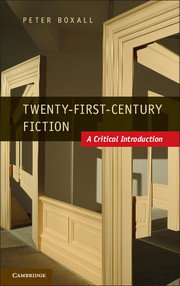Book contents
- Frontmatter
- Dedication
- Miscellaneous frontmatter
- Contents
- Illustrations
- Acknowledgements
- Introduction Twenty-First-Century Fiction
- 1 Late Culture in the Early Twenty-First Century
- 2 Inheriting the Past
- 3 The Limits of the Human
- 4 A Curious Knot
- 5 Sovereignty, Democracy, Globalisation
- Conclusion The Future of the Novel
- Notes
- Bibliography
- Index
Conclusion - The Future of the Novel
Published online by Cambridge University Press: 05 July 2013
- Frontmatter
- Dedication
- Miscellaneous frontmatter
- Contents
- Illustrations
- Acknowledgements
- Introduction Twenty-First-Century Fiction
- 1 Late Culture in the Early Twenty-First Century
- 2 Inheriting the Past
- 3 The Limits of the Human
- 4 A Curious Knot
- 5 Sovereignty, Democracy, Globalisation
- Conclusion The Future of the Novel
- Notes
- Bibliography
- Index
Summary
A formless music for the age to come.
Cormac McCarthy, The RoadThe deeper history of the novel takes place in the future.
Adam ThirlwellRoberto Bolaño’s 2666 contains two possibly conflicting verdicts on the future of literature. The dean of the Faculty of Arts and Letters at the University of Santa Teresa, Augusto Guerra, feels reasonably upbeat about the future of his subject. While he has his doubts about the viability of philosophy, both as an intellectual pursuit and as an academic discipline (‘a discipline’, he says, ‘frankly in decline in the face of the current and future marvels that science has to offer’ [p. 200]), he is more sanguine about the prospects of the literary arts. ‘Literature does have a future’, he says, ‘believe it or not’. ‘Take biographies’, he goes on; ‘there used to be almost no supply or demand and today almost all anybody does is read them’ (p. 200). Boris Abramovich Ansky, however, the Jewish writer and intellectual who is Archimboldi’s inspiration and influence, is more equivocal. ‘He wrote an essay on the future of literature’, Bolaño’s narrator tells us, ‘which began and ended with the word nothing’ (p. 717).
When reflecting on the future of the novel, from our vantage point in the early decades of the twenty-first century, it is possible to see it both from Guerra’s and from Ansky’s points of view. The future of the novel, one might suggest, is suspended somewhere between two historical tendencies, two frames of mind, which are captured, what is more, in the double meaning that is at work in the phrase ‘the future of the novel’. The question of the novel’s future, the future that awaits the novel as a form, as a mode of expression, as a commodity, as an institution, might be addressed with Guerra’s brisk mercantilism.
- Type
- Chapter
- Information
- Twenty-First-Century FictionA Critical Introduction, pp. 210 - 226Publisher: Cambridge University PressPrint publication year: 2013

